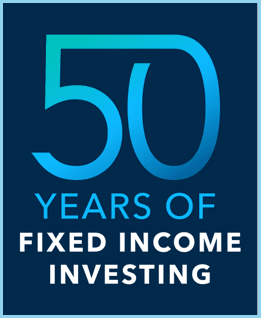Capital IdeasTM
Investment insights from Capital Group
Fixed Income
As rate cycles around the world move toward their peak, we could now be at an inflection point for fixed income.
Credit markets offer fresh opportunities across sectors and with starting yields at levels between 5.5% and 8.5%, the stage is set for positive total returns over the longer term.
Starting yields are often a good proxy for the longer-term total returns that can be expected from bonds. This implies that, in certain areas of the fixed income markets, investors have the potential to realise compelling positive returns from their bond investments over the longer term, with the benefit of lower volatility than equities
Compelling total return potential across credit sectors
Average five-year forward returns at recent yield levels (%)
.png)
Past results are not a guarantee of future results. Yields and returns as at 31 July 2023 in USD terms. Sources: Capital Group, Bloomberg. Data goes back to 2004 for all sectors. Based on average monthly returns for each sector when in a +/- 0.3% range of yield to worst. Sector yields above include Bloomberg US High Yield Corporate 2% Issuer Capped Index, Bloomberg US Corporate Index, JPMorgan EMBI Global Diversified Index and Bloomberg CMBS Ex AAA Index
For investors looking to generate a stable and attractive income stream and more consistent returns, investing broadly to diversify risks rather than concentrating exposure in one sector, could be an appropriate approach particularly in the current environment where even high quality bonds, such as investment grade corporate bonds or securitised credit, offer attractive yields.
To generate consistent income streams, we consider the outlook of four key sectors. The distinctive characteristics of each sector tend to complement each other; combining them could help target reliable income with an attractive risk/return profile.
US high yield provides the potential for a higher level of income. It is a sector with depth and breadth worth c.US$1.2 trillion1 spanning a multitude of industries and issuers. Although associated with higher credit risk, c. 50% of the index is now rated BB (the highest credit quality for high yield)1 and offers a yield of 8.3%.1
Investment grade corporates are higher quality credits, but have longer duration so are more sensitive to movements in rates; an attractive attribute in the event the interest rate cycle turns and central banks cut rates. This is the largest sector in the credit universe; it is well-diversified across issuers and industries, and includes securities with maturities across the yield curve.
Emerging market debt offers diversified sources of income and return. The market for sovereign emerging market US dollar bonds is worth US$1.1 trillion and has average credit rating of BBB.2 It is a diverse with more than 70 investible countries across Asia, Europe, Africa and the Americas. In terms of credit quality, opportunities extend across investment grade and high yield issuers. The divergence between higher and lower quality credits in EMD means bottom-up issuer selection is key to capture opportunities and mitigate risks.
Securitised credit is an under-researched area that provides potential for alpha opportunities. Securitised credit offers a higher level of income than comparably rated investment grade corporates, while typically offering similar capital preservation features. Many of the fundamental drivers are distinct from corporate and sovereign credit, bringing diversity to a portfolio.
Outlook for key credit sectors
Portfolio managers are currently finding opportunities across the full spectrum of credit markets.
In high yield, the resilience of the US consumer has surprised some market commentators. We have seen this resilience play out through persistent strength in consumer spending in travel and leisure, which has supported issuers in cruise lines and the gaming sector.
Idiosyncratic opportunities in investment grade corporates are also arising from greater spread dispersion. Valuations of select global financial institutions and better-capitalised, larger US regional banks in senior tranches are not necessarily reflecting the underlying fundamentals and are priced at wider spreads than our analysis suggests is warranted. Select issuers in the utilities sector also offer potential as they benefit from stable profitability and improvements in their distribution network to protect against natural disasters, such as wildfires.
Valuations in certain segments of the ABS market (subprime auto and car rental) appear to be pricing in a moderate recession but the more senior tranches can withstand a more severe downturn in the economy.
In emerging market debt, managers are finding value in Latin America where central banks have been more proactive than developed market counterparts in hiking rates to tackle inflation. Examples include several Latin American sovereigns in the high-quality investment grade rating cohort such as Mexico, as well as high yield rated issuers including the Dominican Republic, Colombia and Paraguay.
All data as at 31 July 2023 unless otherwise stated. Credit rating based on the higher of S&P/Moody’s/Fitch. Sources: Bloomberg, JPMorgan.
1. As measured by Bloomberg US High Yield Corporate - 2% Issuer Capped Index.
2. As measured by JPMorgan EMBI Global Diversified Index.

Our latest insights
-
-
Long-Term Investing
-
-
Fixed Income
-
RELATED INSIGHTS
-
Portfolio Construction
-
-
Fixed Income
Past results are not predictive of results in future periods. It is not possible to invest directly in an index, which is unmanaged. The value of investments and income from them can go down as well as up and you may lose some or all of your initial investment. This information is not intended to provide investment, tax or other advice, or to be a solicitation to buy or sell any securities.
Statements attributed to an individual represent the opinions of that individual as of the date published and do not necessarily reflect the opinions of Capital Group or its affiliates. All information is as at the date indicated unless otherwise stated. Some information may have been obtained from third parties, and as such the reliability of that information is not guaranteed.
Capital Group manages equity assets through three investment groups. These groups make investment and proxy voting decisions independently. Fixed income investment professionals provide fixed income research and investment management across the Capital organisation; however, for securities with equity characteristics, they act solely on behalf of one of the three equity investment groups.
 Flavio Carpenzano
Flavio Carpenzano